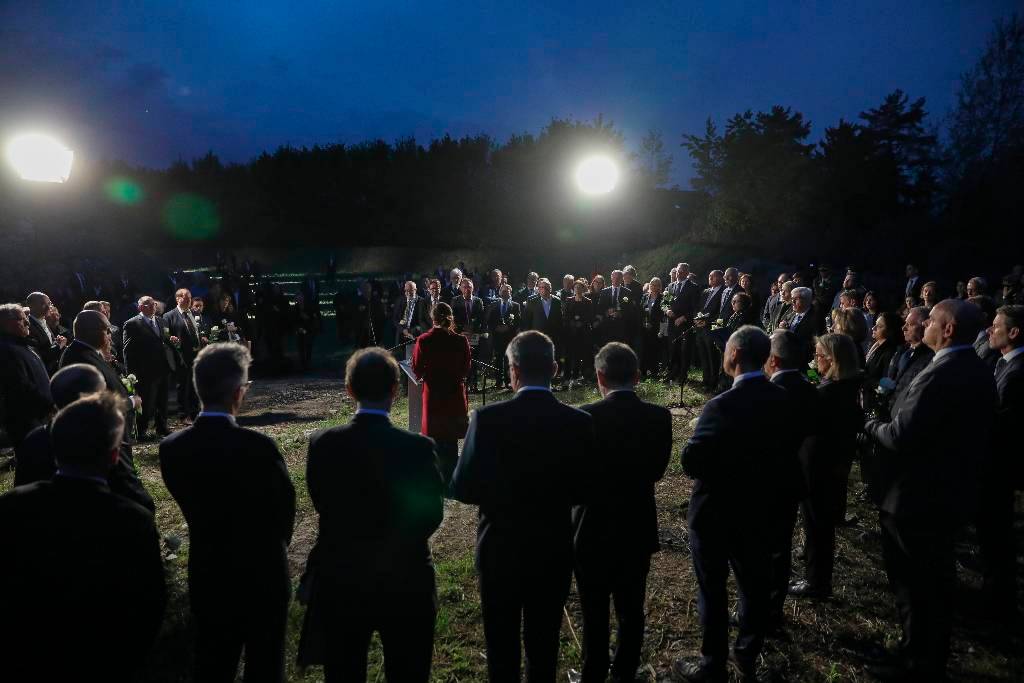Gusen Memorial: first official act of remembrance on the former roll call area
04.05.2022
Mauthausen concentration camp memorial honoured the victims of the concentration camp with an act of remembrance at the former roll call area in Gusen on the eve of the 77th anniversary of the camp’s liberation. Federal President Alexander Van der Bellen, President of the National Council Wolfgang Sobotka, Chancellor Karl Nehammer and other high-ranking representatives of the Republic of Austria paid their respects to the victims.

On 4th May, the eve of the anniversary of the liberation of Mauthausen and Gusen concentration camps, representatives of the victim nations and victim groups, survivor organisations and regional memorial initiatives came together with the Austrian President to commemorate the victims of the Mauthausen camp complex at the former roll call area of Gusen concentration camp. The roll call area was recently purchased by the Republic of Austria, along with other plots on the former camp grounds. Over the next few years, these plots will be developed with involvement from stakeholders at regional, national and international level and integrated into the existing Gusen memorial site.

The act of remembrance, which took place in this form for the first time this year, signalled the Republic of Austria’s willingness to fulfil its responsibility to remember the Gusen concentration camp and honour its victims with dignity.
“We want to put what unites us ahead of what divides us, with the aim of creating a meeting place of international solidarity here in Gusen that is worthy of the memory of the victims. This will lay the foundation for us to pay appropriate tribute to the dignity and significance of the site,” said Federal President Alexander Van der Bellen.
“It is our duty to keep memory alive and to take decisive action against any attempt to forget the atrocities committed during the Nazi era. Awareness of these crimes and commemoration of the victims encourage us to always stand up for the respect of human dignity,” stressed President of the National Council Wolfgang Sobotka.
“Today, Mauthausen and Gusen serve not only as memorials, but also as important reminders. Because we have a responsibility not only to the victims and their descendants, but also to one another, to continue to remind ourselves of the atrocities committed by the Nazi Party,” affirmed Federal Chancellor Karl Nehammer.
“We look forward to the task of redesigning the memorial on the basis of our many hopes and ideas. It was important to us to bring everyone together at the start of this process at the former roll call area in Gusen for the first joint commemoration,” said Director Barbara Glück.

In cooperation with Ars Electronica Center Linz, the names of victims of the Mauthausen-Gusen concentration camp complex were read out and projected onto the outer wall of the Gusen Memorial in Langenstein following a commemoration at the former roll call area as part of the #eachnamematters light and sound installation. The art project was also broadcast online via livestream. The installation will also be available for viewing on 5th and 6th May. A further livestream will take place on the anniversary of the liberation, 5th May.
Gusen concentration camp was quickly forgotten in Austria after 1945. Parts of the former camp grounds were built over by a housing estate, while others were used for commercial purposes. In the 1960s, international survivor organisations erected a memorial around the surviving crematorium furnace. The Republic of Austria has been responsible for the Gusen Memorial since 1997. The memorial is now set to be expanded to include the newly-acquired plots which contain the roll call area, the rock crusher and two SS administration buildings.